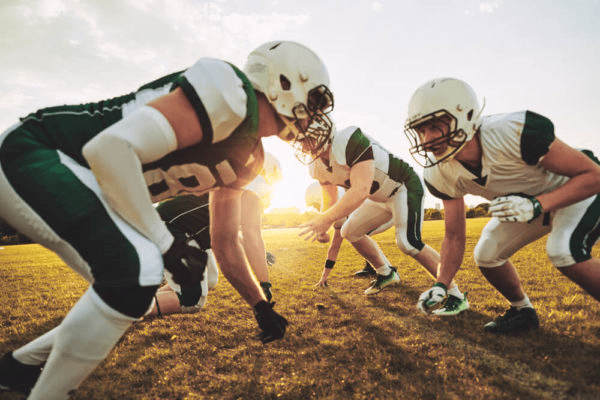
Featured Doctor
Brian Capogna, MD
Dr. Capogna is an orthopedic surgeon at Orthopaedic Associates of Manhasset, specializing in shoulder, elbow, hip and knee injuries. Please call his office at (516) 627-8717 to schedule an appointment or schedule an appointment online.
View Profile

By Brian Capogna, MD, sports medicine surgeon at OAM
Football can be a big part of a high schooler’s life. Friday night games are a place for members of the community to come together to support their local athletes.
I dedicate every fall weekend to providing sideline coverage for high school and college games. I treat orthopedic injuries and evaluate head trauma to advise whether or not to remove a player from the game to keep our athletes safe.
As part of my physician coverage, I also perform pre-season physicals. These are an important part of keeping student athletes safe as they embark on a new season. During these evaluations, we take a deep look at the kinematics of the lower extremities. We make sure players are jumping and landing both correctly and symmetrically on each side of the body.
Common football injuries can include hamstring strains, ankle sprains, posterior labral tears (usually an ailment for offensive linemen), shoulder dislocations, core muscle injuries (sports hernia), and ACL tears.
Here are some tips to try to keep injuries at bay:
1. Stay strong and balanced. It’s important to keep the hip external rotators strengthened so that when players jump, they don’t buckle when they land. Keeping the hip in a more externally rotated position when landing prevents the knee from landing in a “knock-kneed” position which can lead to a buckling episode. I talk to athletes about making sure their quad and hamstring strength is balanced. When one is weaker than the other, players can be more susceptible to injury.
2. Learn proper techniques. It’s a fact – concussions can occur during football. It’s important to teach kids how to correctly hit and tackle. Don’t lead with your helmet, which leaves your head and neck exposed to the majority of the contact and leads to a high risk of injury.
3. Stay hydrated. Dehydration can be a big issue. This is especially important during pre-season when the weather may be warmer. Cramps and heat exhaustion can occur when students eat an unhealthy meal and/or drink a soda before an outdoor practice in 90-degree heat. Proper hydration and electrolytes are needed to play safely. Pre-game meals should be nutritious and not include saturated fats or processed foods that won’t provide the energy required to play a competitive game.
4. Remember to always warm up before and cool down after games. Warming up is incredibly important to get your body ready for competitive play. It’s also very useful to perform some light stretches to cool down after games.
5. Maximize your flexibility. Focus on endurance training instead of just bulk and strength training to keep you going the whole season.
6. Cross-train. When you play multiple sports, you are honing different skills (for example, agility from basketball, strength from football, hand-eye coordination from baseball, etc.), which will make you a better all-around athlete down the road.







